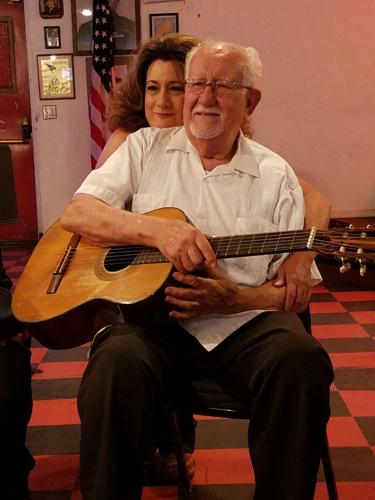“Bobby, trae tu guitarra y cantanos una buena canción.”
“Yes, Bobby, bring your guitar and sing ‘Sabor a Mi.’ You know it’s my favorite.”
“Hey, everyone, Bobby’s here! Time to start the fiesta. Bobby ya llegó.”
“Orale, Bobby, avientate una canciones padres, like the last time.”
Bobby and his guitar. Bobby the troubadour. Wherever Bobby went, songs followed.
But no more.
Robert Lee Benton Jr., a proud son of proud Barrio Anita, passed away last Sunday, surrounded by his shocked and grieving family. He suffered an aneurysm on March 22. He was 80 years old and preparing to celebrate his April 10th birthday with family and friends at the Marine Corps League Detachment club in South Tucson. With his guitar, of course.
“When he’d show up, people would ask him right away where’s his guitar,” said Pat Benton, his wife of 51 years. He loved to be asked.
Bobby, who loved to tell jokes, represented all that is good and beautiful about Tucson, its history and its culture. He wasn’t a big-name business owner. His name is not attached to a University of Arizona building. He was not feted for his many hours of community service that came in the form of singing Tucson’s praises, and singing the songs that he heard his tíos and other family members sing in Barrio Anita gatherings.
He was as Mexican-American as they came.
His daughter, Cristina Benton, said, “He loved his family history. He was a proud Tucsonan.”
Bobby L.O.V.E.D. Tucson. He was as dependable as the late-summer chubascos that bathe the desert floor. His songs were part of our Pimería Alta soundscape like the morning doves. His soul was as inviting as the sunrise over the Rincon Mountains.
“Just as soon as you heard his voice, a smile would come to your face,” said fellow Tucson guitarist Ted Ramirez, who often would join Bobby in song. “And he did that for the whole community.”
Pat, a former journalist with the Arizona Daily Star, said that Bobby, a self-taught musician, didn’t consider himself a good guitarist although he practiced constantly. But Bobby’s friends thought he was the best. And that is what mattered the most. What mattered is that Bobby and his guitar were present and ready to rewaken our cultural memories — and to create new ones — when he was asked.
“I’d do anything to hear him sing again,” said his daughter, who often sang duets with her father.
Pat said he recorded four records. One album on which he is heard is the 2002 release “Heroes and Horses: Corridos from the Arizona-Sonora Borderlands,” on Smithsonian Folkways Recordings, produced by Tucson folklorist James “Big Jim” Griffith. Bobby and Tucsonan Oscar Gonzalez sing three classics: “El Moro de Cumpas,” “El Corrido de Nogales” and “La Cárcel de Cananea.”
Pat said Bobby never wanted to be the solo act. “He shared,” she said. Bobby would often join other musicians, local and nationally known, in informal sessions. Whenever Tucson-born Eduardo “Lalo” Guerrero was in town, Bobby would join him.
While Bobby was well-versed in the standards, he loved to pull out older, unfamiliar songs from the deep canon of Mexican music. He also belted out with soldier pride the national anthem at various events.
Ramirez said Bobby represented the musical oral tradition of passing down songs and his method of playing the guitar. “It represented an era of Mexican music that seems to be slipping away,” Ramirez said.
Bobby began singing as a kid at Holy Family Catholic Church, north of downtown, across from Barrio Anita in the Dunbar/Spring neighborhood. His church singing stayed with him, but over the years he would sing and play his guitar almost anywhere.
He was involved with various community groups, from the historical preservationists Los Descendientes del Presidio de Tucson to the Tucson Kitchen Musicians Association, sponsor of the annual Tucson Folk Festival.
Ramirez said Bobby, a U.S. Army veteran, had many dimensions to him from both sides of his family — Mexican and American. His Benton grandfather had a mansion in Snob Hollow, and his mother, Amelia Tellez, descended from a Presidio soldier from Tucson’s colonial days. Bobby’s 105-year-old mother and his younger brother, Eugene Benton, both died in 2017.
One of Bobby’s biggest joys was his participation in the “Barrio Stories,” productions of the Borderlands Theater. Conducted outdoors, on site, “Barrio Stories” offered oral histories of Barrios Viejo and Anita. Bobby was a key component of both productions, not just for his singing and playing, but for his deep knowledge of the barrios’ histories, families and traditions.
Marc David Pinate, Borderlands’ producing artistic director, said Bobby was generous with his time and could always be counted on to recruit musicians to perform or old-time barrio residents to recite stories.
“He made you feel like family. He made you feel safe, comfortable, like a trusted tío,” Pinate said.
Cristina said her dad was big on tradition and family. Her daddy looked at everyone as his family.
“He loved life. He loved people,” she said.
So when his wide circle of Tucson familia gathers Monday morning at St. Augustine Cathedral to give their despedida, it will be our turn to sing to a good guy from Barrio Anita.





